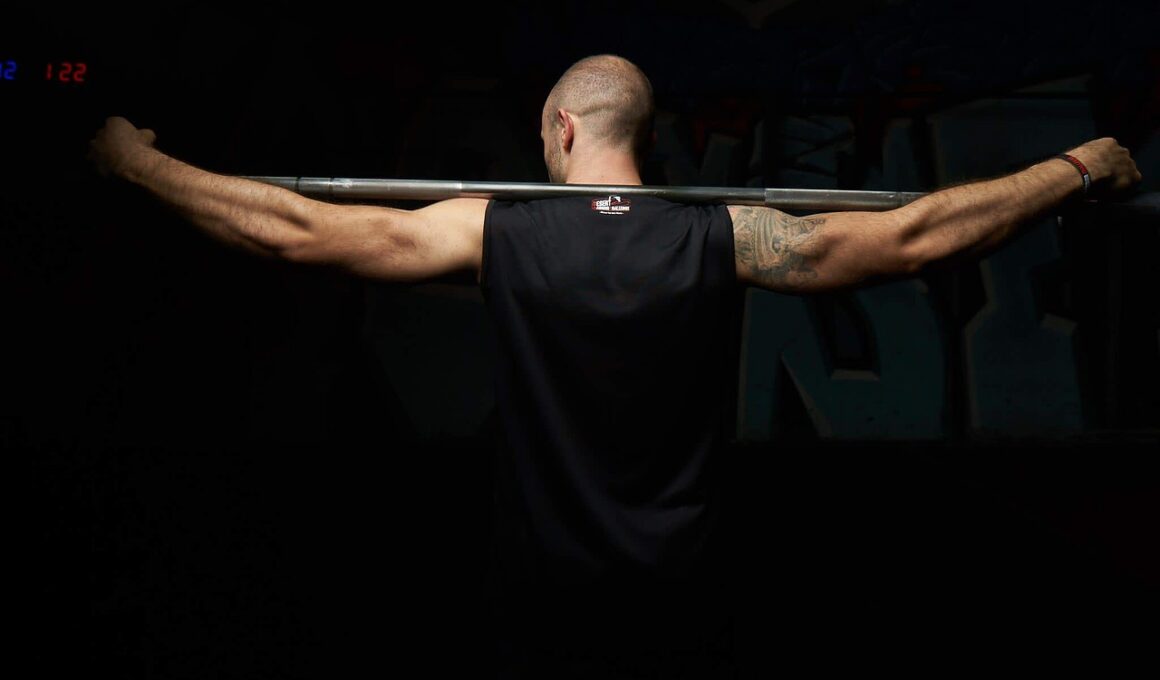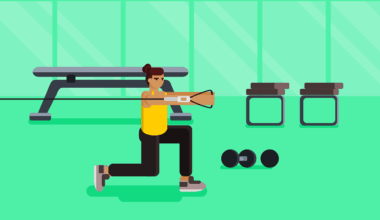Using Powerlifting Groups to Improve Mental Toughness
Participating in powerlifting groups offers numerous advantages, particularly in enhancing mental toughness. The environment created in these groups fosters resilience as members push each other to exceed personal limits. These sessions provide an outlet for individuals to confront and overcome physical challenges collectively, which directly influences their mental fortitude. Training with others allows for shared successes and setbacks, serving as a motivational factor that encourages persistence. Powerlifting inherently demands a mindset geared towards accountability and improvement, both of which are crucial for cultivating mental toughness. The camaraderie found within these groups often helps individuals to cope with stress better, allowing them to become more adept at handling various challenges outside of the gym. Adopting a supportive culture enhances the psychological benefits of strength training, making individuals feel empowered. Moreover, being part of a group can instill a sense of obligation to attend sessions, leading to a consistent workout regime that builds not only physical strength but mental persistence. As members share their stories and struggles, they learn valuable lessons on resilience that can be applied in daily life. Through collective experiences, group dynamics further enrich the journey towards mental toughness.
Building relationships within powerlifting groups can significantly contribute to improving mental toughness. Social interactions during workouts lead to positive reinforcement, motivating members to strive for improvement. Engaging in conversations with experienced lifters helps novices gain valuable insights and tips on both technique and mindset. Such interactions foster a sense of belonging, which is vital for enhancing psychological resilience during periods of self-doubt. Each member’s perspective offers a unique opportunity to learn how to deal with failures and celebrate victories together. This supportive network ensures that participants can tackle their personal goals alongside others facing similar challenges. Additionally, sharing individual stories cultivates a deeper understanding of the struggle involved in achieving success. When members recount their experiences overcoming adversity, it becomes a source of inspiration, encouraging everyone to persevere. As ties strengthen, so does the inherent motivation to showcase improvement regularly. The collective strength of a group often amplifies an individual’s ability to push beyond mental barriers. Consequently, the powerlifting community fosters an environment that bolsters each participant’s grit and determination, proving that mental toughness is as vital as physical strength in achieving fitness goals.
The Role of Shared Goals in Powerlifting
In powerlifting groups, having shared goals significantly enhances mental toughness among participants. When members set collective targets, they become accountable to one another, fostering a sense of commitment to those objectives. This shared vision not only strengthens group cohesion but also adds a valuable layer of motivation to every training session. Encouraging one another to devote time and effort towards achieving these goals fuels a competitive spirit that ultimately leads to improvement in individual performance. Additionally, the accountability factor dissuades complacency, pushing participants to show up consistently and give their best effort. These dynamics create an environment wherein mental barriers begin to dissolve as members regularly witness progress in their fellow lifters. Such accountability encourages individuals to face their fears and insecurities head-on. The consistent interaction within the group provides a fertile ground for developing a resilient mindset. As everyone evolves in their capabilities, they collectively push all limits. Furthermore, celebrating milestones together fosters an atmosphere of positivity while highlighting the inherent connection between teamwork and individual success in powerlifting.
Challenge in powerlifting is not solely physical; it stretches deeply into mental realms as well. By engaging in intense training regimens, group members confront the mental challenges posed by self-doubt and the fear of failure. One of the most effective ways to build mental toughness involves embracing discomfort during challenging lifts, often supported by fellow group members. As individuals push through these discomforting moments, they learn resilience—the cornerstone of mental toughness. It becomes apparent that overcoming struggles in the weight room translates to improved coping strategies for challenges in everyday life. The shared experience of failure and perseverance creates a bond among members, knitting them closer together. This group dynamic fosters understanding and empathy during tough times, both inside and outside the gym. Participants develop trust within their teams, contributing to a safety net that encourages risk-taking and growth. Consequently, as they tackle more weight or difficult lifts, they strengthen not only their bodies but also their minds. This reciprocal relationship between physical progression and mental fortitude becomes a community hallmark that positively influences each member’s performance.
Strategies for Building Mental Toughness
Powerlifting groups provide an ideal platform for developing mental toughness through various structured strategies. First, effective goal-setting tremendously benefits participants by offering clear targets to work towards, fostering dedication and focus. Members can work together to outline both short-term and long-term objectives, ensuring that everyone remains on track. Secondly, incorporating varying intensities into workouts challenges the mind to adapt further. Unique lifts and training sessions promote mental resilience as members learn to navigate discomfort and frustration. Another effective strategy lies in visualization techniques. Group members can benefit significantly by encouraging one another to visualize successful lifts, reinforcing confidence in their abilities. Practicing mindfulness during workouts also allows individuals to become more attuned to their thoughts and emotions, fostering a greater understanding of their limits. Lastly, adopting a growth mindset ensures that participants embrace challenges without fear, viewing them as opportunities for improvement rather than failures. Together, these strategies instill a sense of empowerment, leading to greater mental toughness as individuals navigate their powerlifting journeys while supporting one another along the way.
Overcoming obstacles plays a critical role in enhancing mental toughness in powerlifting groups. Each member faces their unique challenges, whether related to technique flaws, physical limitations, or mental barriers. As individuals work to conquer these hurdles, they develop skills that translate beyond powerlifting. Strengthening mental resilience primarily stems from the collective experiences of addressing failure and learning how to rise stronger after each setback. Understanding that struggles are common among all participants helps diminish feelings of isolation. This shared experience promotes camaraderie, inspiring group members to push through tough days together. Reciprocated support allows everyone to realize that setbacks are merely stepping stones rather than dead ends. Encouraging each other through difficulties cultivates an environment where every member feels valued and motivated to improve. Furthermore, celebrating these achievements, however small, reinforces the mantra that every effort counts, within and beyond the gym. Together, powerlifting groups create a culture of perseverance where mental toughness thrives through collective hardships. By confronting obstacles side by side, participants emerge stronger not only as athletes but as resilient individuals, equipped with the tools necessary to tackle life head-on.
The Impact on Overall Well-Being
Leveraging the power of group dynamics in powerlifting can substantially improve overall mental well-being. Engaging in regular strength training fosters not only physical health but also enhances emotional resilience through community support. As individuals connect with one another, they share resources, knowledge, and encouragement, resulting in a cumulative uplifting effect. The motivation derived from positive relationships within powerlifting groups can significantly reduce symptoms of anxiety and depression, creating a more balanced state of mind. Moreover, participating in structured workouts gives members a sense of purpose and accomplishment, essential factors for maintaining mental well-being. This sense of accountability to the group promotes a routine that ultimately contributes to better emotional stability and resilience. When these individuals experience setbacks, the support of their peers enables them to bounce back with stronger resolve. Thus, powerlifting groups play a crucial role in building connections that foster both individual and collective mental health. Conclusively, by addressing mental toughness while collaboratively working towards lifting goals, these groups significantly contribute to overall well-being and resilience of all members involved in this dynamic fitness journey.
In conclusion, participating in powerlifting groups serves as an invaluable opportunity for enhancing mental toughness. The environment created fosters accountability, camaraderie, and shared goals, all crucial for developing resilience. Each experience shared within these groups enriches individual journeys and instills a collective sense of strength that emerges from facing challenges together. The strategies employed, from goal-setting to celebrating milestones, empower all participants in their growth both mentally and physically. Furthermore, overcoming obstacles showcases the importance of perseverance and creates lasting bonds between members, allowing them to learn from failures and triumphs collectively. This dynamic group culture promotes a positive atmosphere where members can thrive and push past their limits, encouraging them to face future challenges both in the gym and beyond. Ultimately, embracing the supportive nature of powerlifting groups cultivates not only stronger athletes but also mentally robust individuals ready to tackle life’s challenges head-on. The impact on overall well-being, driven by community connections, highlights the inherent benefits of working together towards a common purpose. Thus, leveraging the power of group fitness can lead directly to improvements in mental toughness, ensuring a richer life journey for all involved.


